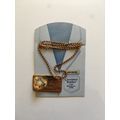Bonchurch, Isle of Wight - Tuck's Oilette postcard c.1910s
- Condition : Used
- Dispatch : 2 Days
- Brand : None
- ID# : 125000404
- Quantity : 1 item
- Views : 357
- Location : United Kingdom

- Seller : justthebook (+1704)
- Barcode : None
- Start : Fri 28 Feb 2014 05:16:38 (EDT)
- Close : Run Until Sold
- Remain : Run Until Sold
Checks/Cheques
 for 1 item(s) edit
for 1 item(s) edit
Shipping Calculator
More Listings from This Seller view all
Seller's Description
- Postcard
- Picture / Image: Bonchurch, Isle of Wight
- Publisher: Raphael Tuck 'Oilette' 'Isle of Wight' No. 792
- Postally used: no
- Stamp: n/a
- Postmark(s): n/a
- Sent to: n/a
- Notes / condition:
Please ask if you need any other information and I will do the best I can to answer.
Image may be low res for illustrative purposes - if you need a higher definition image then please contact me and I may be able to send one.
------------------------------------------------
Postage & Packing:
UK (incl. IOM, CI & BFPO): 99p
Europe: £1.60
Rest of world (inc. USA etc): £2.75
No additional charges for more than one postcard. You can buy as many postcards from me as you like and you will just pay the fee above once. (If buying postcards with other things such as books, please contact or wait for invoice before paying).
Payment Methods:
UK - PayPal, Cheque (from UK bank) or postal order
Outside UK: PayPal ONLY (unless otherwise stated) please. NO non-UK currency checks or money orders (sorry).
NOTE: All postcards are sent in brand new stiffened envelopes which I have bought for the task. These are specially made to protect postcards and you may be able to re-use them. In addition there are other costs to sending so the above charge is not just for the stamp!
I will give a full refund if you are not fully satisfied with the postcard.
----------------------------------------------
Text from the free encyclopedia WIKIPEDIA may appear below to give a little background information (internal links may not work) :
*************
Bonchurch is a small village to the east of Ventnor, now largely connected to the latter by suburban development, on the southern part of the Isle of Wight, England. One of the oldest settlements on the Isle of Wight,[1][2] it is situated on The Undercliff adjacent to the Bonchurch Landslips (or ""The Landslip"") Site of Special Scientific Interest. The main village is backed by a cliff to the north, with the Upper Bonchurch section on the clifftop halfway up St Boniface Down on the main A3055 road.
Bonchurch is situated on a stable section of former landslip, its main street (Bonchurch High Street) running east-west in a valley sheltered to the north by cliffs, and to the south by The Mount, a ridge of slipped rock. Bonchurch High Street has an adjacent landscaped pond, fed by a spring, on the site of former withy beds. The Shanklin-Ventnor route originally passed through Bonchurch, descending the ciff by the steep Bonchurch Shute; now it is bypassed by the clifftop A3055 Leeson Road.
The presence of a water spring is believed to be the reason why humans first settled in the area where present-day Bonchurch is located.[1][2] A prehistoric race lived in the area[2] around the Undercliff, land which was wild forest.[1] Evidence has also been found showing that men that lived during the Stone Age had lived near to the water spring.[1] Five burial mounds have been discovered at St. Boniface Down.[1] Evidence has also been discovered showing that the Romans[2] established a settlement in the area.[1]
The Saxon patron saint, St. Boniface, is believed to have visited the Isle of Wight, and possibly the area where Bonchurch is now located, in the 8th century. Legend states that monks from Lyra in Normandy landed at Monks Bay, near to modern-day Bonchurch, and erected a building in dedication to St. Boniface. This building could be the wooden building which is believed to have existed in the 9th century where the Old Church now stands.
The first documented proof of the existence of Bonchurch is found in the Domesday Book.[1][2][3] In the Domesday Book, the settlement was called Bonecerce.[3] 'Cerce' is Anglo-Saxon for 'church', whilst 'Bone' is presumed to have been derived from St. Boniface.[3]
Bonchurch has two churches.[1] The oldest one is called the Old Church.[1] The Domesday Book recorded its existence.[1] See Old St. Boniface Church, Bonchurch and St. Boniface Church, Bonchurch.
In July 1545, the Battle of Bonchurch was fought.[4] 500 French soldiers had landed at the coast near Bonchurch, one of three landings that took place on the coastline of the Isle of Wight by French soldiers.[4] 300 Isle of Wight militiamen engaged the French forces, and the militiamen won the engagement.[4] Some accounts state that local women participated in the battle by shooting arrows at the French soldiers.[4] The victory is considered to have decisively stopped the French invasion of the Isle of Wight.[4]
Soon after the battle, a number of men from the French fleet which had retreated from the Solent after the Battle of the Solent landed on the coast near Bonchurch.[4] The men were engaged in a military action by English soldiers whilst they were on a mission to collect fresh water on the island.[4] A French senior officer, Chevalier D'Aux, was killed. His body was buried in Bonchurch, but was exhumed and taken back to France in 1548 after the war between England and France had ceased.[4]
In the late 1830s and onward, the hitherto rural Bonchurch was extensively developed for exclusive private villas, following land acquisition and sale by the Reverend James White. White married Rosa Hill, heiress to the manor of Bonchurch, and subsequently obtained a private local Act of Parliament to overturn parts of his father-in-law's will forbidding development and breakup of the estate.[5] In the mid to late 19th Century, Bonchurch developed into a fashionable centre for writers and artists. Celebrated Victorians such as Charles Dickens, Thomas Carlyle, and Lord Macauley came here and stayed in large villas that they rented, often for the season.
The poet Algernon Charles Swinburne spent his boyhood in Bonchurch, at East Dene, and was buried in 1909 at Bonchurch New Church, his grave being the subject of a poem by Thomas Hardy. He had an atheist funeral which was picketted in protest by his relatives. In the 20th Century Henry de Vere Stacpoole lived in the village for over 40 years, and was buried here in 1951.
type=printed postcards
theme=topographical: british
sub-theme=england
county/ country=isle of wight
number of items=single
period=pre - 1914
postage condition=unposted
Listing Information
| Listing Type | Gallery Listing |
| Listing ID# | 125000404 |
| Start Time | Fri 28 Feb 2014 05:16:38 (EDT) |
| Close Time | Run Until Sold |
| Starting Bid | Fixed Price (no bidding) |
| Item Condition | Used |
| Bids | 0 |
| Views | 357 |
| Dispatch Time | 2 Days |
| Quantity | 1 |
| Location | United Kingdom |
| Auto Extend | No |



















